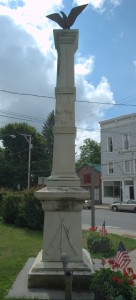
The words of Joshua Lawrence Chamberlain (1828-1914) in Ken Burns great series, ‘The Civil War’, ring almost as clearly as his actions.
For years I’ve had his memoir, The Passing of the Armies (1915)[1], of the War’s final weeks and the two months after Appomattox. I picked it up the other day and read for the first time his chapters describing the reviews of the Army of the Potomac and of the Army of the West (Chamberlain’s term for William Tecumseh Sherman’s command) following the South’s surrender.
I learned Sherman ‘took pains to make it manifest that he refused to take [Secretary of War] Stanton’s offered hand’ on the reviewing stand of the Army of the West. Edwin Stanton had countermanded humiliatingly Sherman’s generous terms of surrender to the Confederate army he’d pursued across the south.[2]
Nor had I realized the tensions between the Armies of the Potomac and the West:
At first the greetings where such as good-fellowship … prompted. But we were soon made aware of a feeling we had not before suspected on the part of many of our comrades of the Western army…. There seemed to be a settled dislike to us, latent at least, among Sherman’s men….
…In fact so serious did the discord grow that the division commanders had to take positive measures for defense, – as throughly as before on the flanks of the Petersburg lines. We doubled all camp guards, and detailed special reserves ready for a rush; sleeping some nights in our boots, with sword and pistol by our sides….
To everyone’s credit, nothing happened.[3]
When Sherman’s army passed on review, Chamberlain noted:
Following next is swarthy John Logan, leading the Army of the Tennessee, and Hazen with the Fifteenth Corps. Each division is preceded by its corps of black pioneers, shining like polished ebony, armed with pick and spade, proud of their perfect alignment, keeping step to the music with inborn stress. Significant frontispiece.[4]
Chamberlain’s descriptions of the parade of the Army of the Potomac are deeply personal, as one would expect from one whose service in it began in August 1862 and included Gettysburg and parts of the terrible Virginia campaign of 1864-65, when he was not recuperating from several wounds.
At a remove of almost 50 years, he reviews his comrades as in memory they march by:
Here passes the high-borne, steadfast-hearted 17th Maine from the seething whirlpool of the wheat-field at Gettysburg to the truce-compelling flags of Appomattox. To-day its ranks are honored and spirit strengthened by the accession of the famous old 3d Regiment, – that was Howard’s. Some impress remains of firm-hearted Roberts, brave Charley Merrill, keen-edged West, and sturdy William Hobson; but Charley Mattocks is in command these days, – a man and a soldier, with the unspoiled heart of a boy. Three of these, college mates of mine. What far dreams drift over the spirit, of the days when we questioned what life should be, and answered for ourselves what we would be![5]
With each passing brigade, such as Webb’s, Chamberlain recounts something like this:
Here are all that is of left of French’s old division at Antietam, and Hays’ at Gettysburg, who was killed in the Wilderness, Carroll’s Brigade at Spottsylvania, where he was severely wounded; Smyth’s at Cold Harbor, killed at Farmville. In this brigade Owen’s, too, is now merged.[6]
And then:
The pageant has passed. The day is over. But we linger, loath to think we shall see them no more together, – these men, these horses, these colors afield. Hastily, they have swept to the front as of yore; crossing again once more the long bridge and swaying pontoons, they are on the Virginia shore, waiting, as they before had sought, the day of the great return.[7]
Speaking to his contemporaries, Chamberlain charges them:
Sit down again together, Army of the Potomac! all that is left of us…. The old is young today; the young is passed. Survivors of the fittest, – for the fittest … abide in the glory where we saw them last…. Who shall tell what is past and what survives? For there are things born but lately in the years, which belong to the eternities.[8]
Notes
1. Joshua Lawrence Chamberlain, The Passing of the Armies [1915], photo facsimile as published by Morningside Press, Dayton, OH, 1982. Chamberlain died in 1914 with the manuscript still in preparation. What a play on words its title is!
2. Id., p. 369.
3. Id., pp. 372-73.
4. Id., p. 365.
5. Id., p. 358.
6. Id., p. 355.
7. Id., p. 359.
8. Id., p. 363.
Recent Comments